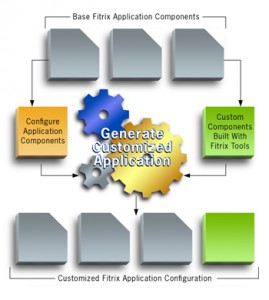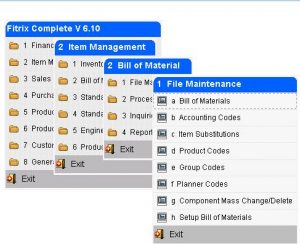The concept of ‘mass customization’ is a fact of life in distribution and manufacturing businesses. To satisfy customer expectations, companies must be able to produce small quantities (i.e., ONE unit) of specifically configured or designed product to a large volume of customers – and they must do this in a competitively short lead time.
Modern computing platforms have both the capacity and processing power to support the capture and storage of these details, but does the ERP system have the needed functionality to seamlessly and efficiently manage this information? Does it require tedious extra steps, and manual workarounds, to give the users the data they need, or is it built-into the business processes as part of daily activities?
Serialization should address the following requirements to effectively support a distributor or manufacturer:
- Record and retrieve both the manufacturer and internally assigned serial numbers for purchased items
- Record or assign serial numbers for manufactured items used as intermediate components, or end items sold to customers
- Record and retrieve serial numbers when product is sold to customer
- Record the ‘as built’ relationships between serialized purchased items, sub-components, and end items sold
Serialization for Purchased Items
Serializing a purchased item is important whenever an issue with the item needs to be communicated back to the supplier. Since many suppliers serialize the items they sell, it becomes critical to electronically record them at time of purchase. This prevents endless review of paper documents when attempting to retrieve the purchase details for a component that has failed. In addition, an effective system should be able to trace the lifecycle of the serialized item, to easily show where it was consumed in the manufacturing process, or where and how it ultimately left the facility to end up in the hands of a customer.
It is also a common requirement to trace a serial number back to the original purchase transaction, to see related serial numbers that were received on the same purchase order, and be able to trace those serial numbers to their final destination. In this way, a faulty unit discovered after failure ‘in the field’ can be traced back to the original suppler and transactions of a related ‘batch’ of units, and then traced forward to other affected units in the field.
Finally, recording the receipts for these items should be seamless and efficient. They should make maximum use of collection devices such as barcode scanners to quickly record manufacturer serial numbers (these large numbers may not be accurately recorded by hand), and automate the assignment of internal serial numbers.
Serialization for Manufactured Items
Manufacturers very commonly serialize items they produce, whether they are used at a higher level of a multi-level bill of material, end items manufactured to stock, or manufactured directly for sale to customers. To support this process, serial numbers are typically assigned automatically, either at the beginning of production or as part of the production completion step. The system must be able to auto-generate barcode labels that can be attached at varying stages of production and the serial numbers must be part of any transaction associated with inventory movement.
Production runs for either small or large quantities should also be supported. This means accurately recording serialized component usage to specific units of serialized end items. It is not sufficient to know that 25 serialized power supplies went into the production of 25 PCs on a large run. We need to know which power supply went into each specific PC.
As with the purchase receipt of goods, the capture of component material usage, and end item put-away in production should be easily done via barcode scanners at the actual physical point of usage in real-time mode.
Serialization for Sellable Items
Serialized items that are sold to customers may be processed in a variety of approaches. They may be sold directly from stock. Or they may be sold as part of a ‘make-to-order’ or ‘engineer-to-order’ run that is related to a specific sales order. In any case, the individual units sold must be identified at the serial number level, to facilitate:
- Traceability back to component details used in production
- Warranty-tracking for field support
- Material returns via RMA
And, consistent with other areas of inventory movement, the staging of serialized items for shipment should include the ability to accurately scan internally assigned barcode labels with a scanner.
Tracking Serialized ‘As Built’ Details
This ability is a key feature to electronic manufacturers. It is imperative in resolving both customer and supplier issues in a timely and accurate manner.
As noted earlier, if a customer encounters issues with a product they purchased, they may be able to identify the original sales document but that is often not the case. If they can identify the serial number of the product or any of its individual internal components, the ERP system should be able to use that information to quickly retrieve all the other related information (such as the sales order, the production order and the supplier of serialized part.
Conversely, if a supplier communicates an issue with a purchased product, it is important to be able to easily determine where and when the parts were purchased and where those items are today, whether in stock, consumed by one or more production runs, or in the hands of customers. Once determined, there should be automated notification support in place to make sure customers and production personnel are aware of the issue so they can act accordingly.
Dealing with serialized items adds a layer of complexity to the inventory, production, purchasing, and sales activities in an enterprise that can cripple many ERP systems. Manufacturers are keenly aware of the need for seamless and built-in support for this functionality. It is not a feature which can be ‘bolted on’ after the fact; it must be part of the initial design of a comprehensive system. As such, it must be capable of recording and tracking serial detail from point of purchase all the way through the supply chain. It is therefore worthwhile to review and understand in detail the serialization support that is offered in any ERP system you are evaluating.





